Event Store graph and injection policies
This document describes the Event Store injection policies and provides outline of existing Event Store tables. The graph snapshot of data collected by Event Store is described by a concrete example of various injection steps.
Event Store tables:
Here we represent a list of tables used by Event Store. The bold names are primary keys in those tables and italic names represents the group index (for faster lookup).
FileID
| fileId |
fileName |
typeId |
Here
fileId is an unique file identifier in
EventStore associated with every stored file.
KeyFile
| graphId |
view |
run |
uid |
keyFileId |
Here
graphId is an id assigned to the graph;
view represents a user skim (e.g. qcd);
uid is unique id of underlying file(data), e.g. for real data it is alwasy 1, for MC it's unique id. This
uid is a part of syncValue=(run#,event#,uid).
keyFileId is a key file id.
Location
| id |
graphId |
run |
uid |
locationFileId |
id represents the internal unique identifier which allows store multiple entries for the same
(graphId,run,uid) group index.
locationFileId is a location file id.
FileType
| id |
type |
description |
id represents the internal unique identifier, type is a file type (e.g. pds, ikey, lpds, etc.)
OrphanFile
| id |
dateTime |
user |
SpecificVersion
| svName |
svid |
svName stands for Specific Version Name (or data version name) and
svid its id.
PathDepend
| parentId |
childId |
both parentId and childId are svid's, but show a dependencies among the graph.
Version
| id |
grade |
timeStamp |
minRunNumber |
maxRunNumber |
graphId |
state |
Available grades
Available grades in Event Store
| write |
read |
| daq-unchecked |
daq |
| p2-unchecked |
p2-postprocess |
| physics-unchecked |
physics |
Injection steps
The Greek letters will be used to describe graphId's and roman letters stand for paths within a graph. A graph represents a complete set of data visible to users from a client application.
As an example we will start injection process by injecting a raw data whose parentId=0, timeStamp=0.
Injection I
The first injection attaches data to the daq graph. The injection step affects the following tables: "Version", "GraphPath", "PathDepend", "KeyFile" and "Location" and it starts by updating the "Version" table. In order to add a new graphId, the timeStamp and grade need to be unique or can be the same for a disabled state. For demonstration purposes, we add data which are represented by a path ("0" in a graph represents the parent node and "a" the child node). This path becomes the first available graph (α).
At this step, new key and location files are created. As will be shown further, the keyFileId is an independent quantity. The locationFileId's would be related to the graphId.

| Version |
| 1 |
grade1 |
timeStamp1 |
minR |
maxR |
α |
active |
|
|
|
| KeyFile |
| α |
view |
run |
uid |
key |
|
| Location |
| id1 |
α |
run |
uid |
La |
|
A concrete example for this type of graph would be:
"0" represents raw data assigned to daq grade, "a" represents one pass2 dataset which was injected as "p2-unchecked" grade and "α" is the new graphId.
Injection II
Now we inject a new piece of data represented by node (b). We would like to use this data in conjunction with the original data represented by node (a). To do that we disable the original graphId=α and inject our data using the new graphId=β. After that, our data snapshot looks like
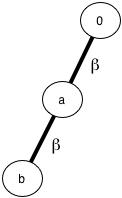
where β represents a full graph.
Version
| 1 |
grade1 |
timeStamp1 |
minR |
maxR |
α |
disable |
| 2 |
grade1 |
timeStamp1 |
minR |
maxR |
β |
active |
|
|
|
KeyFile
| α |
view |
run |
uid |
key |
| β |
view |
run |
uid |
key |
|
Location
| id1 |
α |
run |
uid |
La |
| id2 |
β |
run |
uid |
La |
| id2 |
β |
run |
uid |
Lb |
|
Example: "0" represents data from daq grade, "a" represents pass2 data assigned to "p2-unchecked" grade, "b" represents a post-pass2 correction injected as "physics-unchecked" grade and "β" is the new graphId.
Injection III
Let's assume we made a mistake and found that data (b) need to be replaced by data (b
'). To reflect this change we choose another timeStamp.
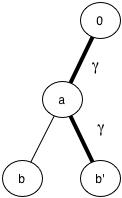
Version
| 1 |
grade1 |
timeStamp1 |
minR |
maxR |
α |
disable |
| 2 |
grade1 |
timeStamp1 |
minR |
maxR |
β |
active |
| 3 |
grade1 |
timeStamp2 |
minR |
maxR |
γ |
active |
|
GraphPath
| α |
a |
| β |
a |
| β |
b |
| γ |
a |
| γ |
b' |
|
PathDepend
| a |
NULL |
| b |
a |
| b' |
a |
|
KeyFile
| α |
view |
run |
uid |
key |
| β |
view |
run |
uid |
key |
| γ |
view |
run |
uid |
key |
|
Location
| id1 |
α |
run |
uid |
La |
| id2 |
β |
run |
uid |
La |
| id2 |
β |
run |
uid |
Lb |
| id3 |
γ |
run |
uid |
La |
| id3 |
γ |
run |
uid |
Lb' |
|
Example: "0" represents data from daq grade, "a" represents pass2 data assigned to "p2-unchecked" grade, "b" represents a post-pass2 correction assigned to "physics-unchecked" grade with "PP2-dataXX-version1" specificVersionName, "b
'" is post-pass2 data assigned to "physics-unchecked" grade with "PP2-dataXX-version2" specificVersionName and "γ" is the new graphId.
Injection IV
Once new data (c) are available we would like to assign them to the same timeStamp as the original processed data (a). To do that we choose another grade. The new graph (δ) represent (0,a,c) nodes.
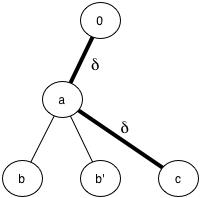
Version
| 1 |
grade1 |
timeStamp1 |
minR |
maxR |
α |
disable |
| 2 |
grade1 |
timeStamp1 |
minR |
maxR |
β |
active |
| 3 |
grade1 |
timeStamp2 |
minR |
maxR |
γ |
disable |
| 4 |
grade2 |
timeStamp1 |
minR |
maxR |
δ |
active |
|
GraphPath
| α |
a |
| β |
a |
| β |
b |
| γ |
a |
| γ |
b' |
| δ |
a |
| δ |
c |
|
PathDepend
| a |
NULL |
| b |
a |
| b' |
a |
| c |
a |
|
KeyFile
| α |
view |
run |
uid |
key |
| β |
view |
run |
uid |
key |
| γ |
view |
run |
uid |
key |
| δ |
view |
run |
uid |
key |
|
Location
| id1 |
α |
run |
uid |
La |
| id2 |
β |
run |
uid |
La |
| id2 |
β |
run |
uid |
Lb |
| id3 |
γ |
run |
uid |
La |
| id3 |
γ |
run |
uid |
Lb' |
| id4 |
δ |
run |
uid |
La |
| id4 |
δ |
run |
uid |
Lb |
|
Example: "0" represents data from daq grade, "0" represents pass2 data assigned to p2-unchecked grade, "b" is post-p2 data assigned to physics-unchecked grade with "PP2-dataXX-version1" specificVersionName, "b
'" is post-p2 data assigned to physics-unchecked grade with "PP2-dataXX-version2" specificVersionName, "c" is another post-p2 data assigned to physics-unchecked grade with "PP2-dataYY-version7" specificVersionName and "δ" is some a new graphId.
Injection V
Finally we decided to combine data (0), (a), (b
') and (c) into unique graph (ε).
Since data (b
') was injected using timeStamp2, we assign new graph with timeStamp2.
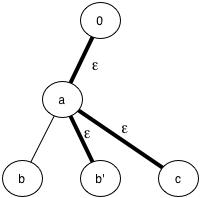
Version
| 1 |
grade1 |
timeStamp1 |
minR |
maxR |
α |
disable |
| 2 |
grade1 |
timeStamp1 |
minR |
maxR |
β |
active |
| 3 |
grade1 |
timeStamp2 |
minR |
maxR |
γ |
disable |
| 4 |
grade2 |
timeStamp1 |
minR |
maxR |
δ |
active |
| 5 |
grade1 |
timeStamp2 |
minR |
maxR |
ε |
active |
|
GraphPath
| α |
a |
| β |
a |
| β |
b |
| γ |
a |
| γ |
b' |
| δ |
a |
| δ |
c |
| ε |
a |
| ε |
b' |
| ε |
c |
|
PathDepend
| a |
NULL |
| b |
a |
| b' |
a |
| c |
a |
|
KeyFile
| α |
view |
run |
uid |
key |
| β |
view |
run |
uid |
key |
| γ |
view |
run |
uid |
key |
| δ |
view |
run |
uid |
key |
| ε |
view |
run |
uid |
key |
|
Location
| id1 |
α |
run |
uid |
La |
| id2 |
β |
run |
uid |
La |
| id2 |
β |
run |
uid |
Lb |
| id3 |
γ |
run |
uid |
La |
| id3 |
γ |
run |
uid |
Lb' |
| id4 |
δ |
run |
uid |
La |
| id4 |
δ |
run |
uid |
Lb |
| id5 |
ε |
run |
uid |
La |
| id5 |
ε |
run |
uid |
Lb' |
| id5 |
ε |
run |
uid |
Lc |
|
Example: "0" represents data from daq grade, "0" represents pass2 data assigned to p2-unchecked grade, "b" is post-p2 data assigned to physics-unchecked grade with "PP2-dataXX-version1" specificVersionName, "b
'" is post-p2 data assigned to physics-unchecked grade with "PP2-dataXX-version2" specificVersionName, "c" is another post-p2 data assigned to physics-unchecked grade with "PP2-dataYY-version7" specificVersionName and "ε" is a new graphId which declared to be usefull for physics analysis.
--
ValentinKuznetsov - 14 Feb 2005
- version_graph1:

- version_graph2:
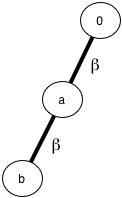
- version_graph3:
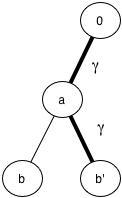
- version_graph4:
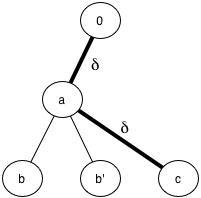
- version_graph5:
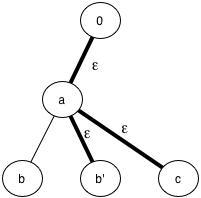










 Copyright © by the contributing authors. All material on this collaboration platform is the property of the contributing authors.
Copyright © by the contributing authors. All material on this collaboration platform is the property of the contributing authors. 